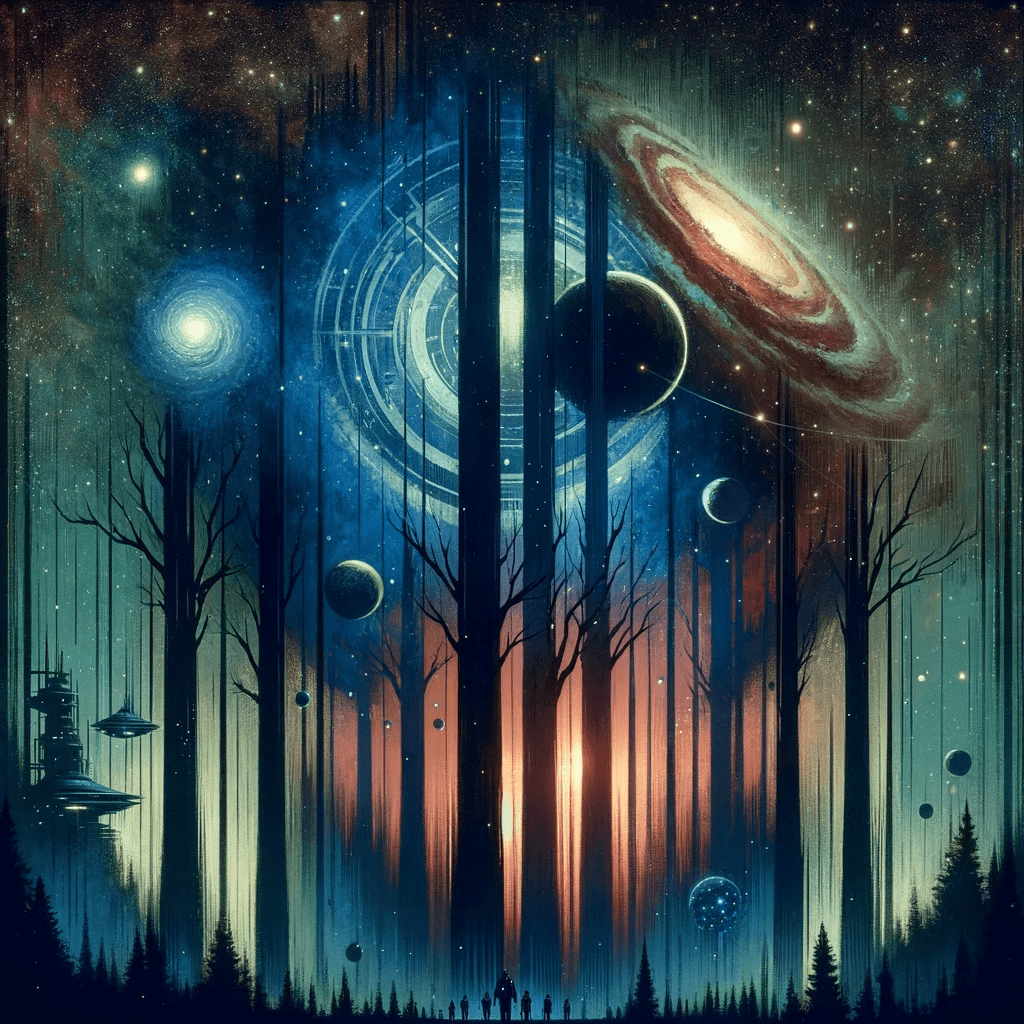The Dark Forest

“The Dark Forest,” the second novel in the “Remembrance of Earth’s Past” trilogy by renowned Chinese author Liu Cixin, is a profound blend of hard science fiction, cosmological theory, and philosophy.
The following are some key takeaways in the book:
- Cosmic Sociology: One of the central tenets of the book is the theory of “Cosmic Sociology,” positing two axioms: survival is the primary need of civilization and civilization continuously grows and expands but the total matter in the universe remains constant. It’s through this theory that the dark forest concept arises, depicting the universe as a vast, silent forest where civilizations are like solitary hunters, hiding for fear of revealing their locations to more advanced, potentially hostile entities.
- The Dark Forest Solution to the Fermi Paradox: The book provides a unique answer to the Fermi Paradox (“Where is everyone?”). In “The Dark Forest”, every civilization in the universe is potentially hostile and the risk of communication or detection by another civilization could lead to annihilation. Hence, all civilizations hide, contributing to the eerie silence in the cosmos.
- Societal Evolution and Crisis Response: The book explores how societies evolve and respond under crisis conditions, especially during the threat of extraterrestrial annihilation. Through the Wallfacer project, it inspects how deception, secret plans, and manipulation are sometimes necessary for survival.
- Specter of Technology: The book raises concerns about our relationship with technology, particularly in the context of weapons of mass destruction and the possibility of their misuse.
- Alien Contact: It underscores that our preconceived notions about alien civilizations may be flawed. The Trisolarans, for instance, do not behave or think as humans do.
- The Relativity of Morality: Cixin shows that morality can be subjective and fluid, especially when survival is at stake. Characters make choices that seem immoral under normal circumstances, but are arguably necessary given the impending apocalypse.
- Technological Evolution and Societal Impact: One can’t ignore the book’s recurring emphasis on the interplay between technological progress and societal evolution. For instance, hibernation technology reshapes humanity’s perspective on time and survival, while the use of quantum entanglement and sophons reveal potential perils and advantages of quantum computing and nanotechnology.
- Anthropocentrism Challenged: The book forces us to reconsider our anthropocentric view of life, intelligence, and civilization. The Trisolaran civilization, despite its stark differences, is capable of technology and thought far surpassing humanity’s current capacity, thereby questioning the primacy and uniqueness of human intelligence.
- Survivalism and Extremism: “The Dark Forest” explores how extreme circumstances can lead to extreme reactions, showing how fear of extinction can drive individuals and societies to make drastic decisions. From Luo Ji’s bold cosmic sociology proclamation to Zhang Beihai’s space-bound survival strategy, the novel sheds light on the lengths to which life will go to ensure its continuity.
The book’s main characters include:
- Luo Ji: A sociologist and astronomer who becomes one of the Wallfacers.
- Zhang Beihai: A naval officer who plays a key role in humanity’s space defense.
- Ding Yi: A theoretical physicist and a friend of Luo Ji.
- Yan Weining: A mathematician and love interest of Luo Ji.
- Shi Qiang (Da Shi): An unpredictable and resourceful detective who is Luo Ji’s bodyguard.
- Thomas Wade: One of the Wallfacers and a former US Secretary of Defense.
- Sophon: A Trisolaran probe with self-awareness and advanced technology.
There are various books and academic papers discussing “The Dark Forest” and its themes:
- “Alien Worlds and the Fate of the Earth: Liu Cixin’s ‘The Dark Forest’ and the Posthuman” by Li Hang: This book explores the implications of Cixin’s posthumanistic ideas and how they challenge traditional human-centric views.
- “Cosmic Sociology and SETI: The Surprising Societal Impact of ‘The Dark Forest'” by Robert Lambourne: Lambourne dives into the theory of Cosmic Sociology and its potential influence on our approach to the Search for Extraterrestrial Intelligence (SETI).
- “The Philosophy of ‘The Dark Forest’: A Study in Existentialism and Beyond” by Martin Bridgstock: The book provides a detailed philosophical analysis of the existential questions raised in “The Dark Forest”.
“The Dark Forest” is an exploration of the Cosmos not just in terms of its physicality, but also its sociological and philosophical aspects. It pushes the boundaries of our imagination and challenges our assumptions about civilization, intelligence, and the universe we inhabit. The diverse analyses and studies on this book are a testament to its depth and thought-provoking nature.


